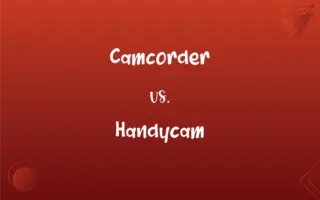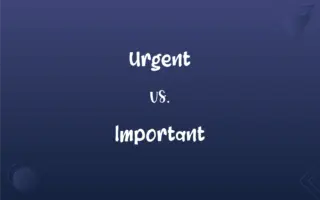Shall Be vs. Would Be: What's the Difference?
Edited by Aimie Carlson || By Harlon Moss || Published on December 4, 2023
"Shall be" is used to express future actions or obligations, while "would be" is used to indicate conditional actions or hypothetical situations.

Key Differences
"Shall be" is a formal way to express future actions or events, often implying a sense of obligation or determination. "Would be" is used to describe hypothetical situations, often contingent on certain conditions or circumstances.
In legal or formal contexts, "shall be" is used to denote something that is intended or required to happen. "Would be" indicates a potential action or state in the context of a hypothetical scenario or in polite requests.
"Shall be" is often used in situations where the outcome is somewhat certain or prescribed. In contrast, "would be" is used in speculative statements, reflecting uncertainty or conditions not yet met.
"Shall be" carries a tone of formality and is less commonly used in everyday conversation, primarily seen in written documents. "Would be" is more versatile, used in everyday language to express polite requests, conditional statements, or future speculations.
The use of "shall be" is more common in British English, particularly in legal documents, where it denotes mandatory actions. "Would be" is widely used in both American and British English to discuss possibilities or imagined situations.
ADVERTISEMENT
Comparison Chart
Usage
Expresses future actions, obligations.
Indicates conditional actions, hypothetical situations.
Context
Formal, legal, mandatory scenarios.
Speculative, polite requests, uncertain scenarios.
Tone
Formal, authoritative.
Versatile, often used in polite or speculative language.
Certainty
Implies a higher degree of certainty or requirement.
Reflects uncertainty, dependent on conditions.
Common Use
More prevalent in legal documents, British English.
Widely used in both American and British English.
ADVERTISEMENT
Shall Be and Would Be Definitions
Shall Be
Used to express future actions or events in a formal context.
The meeting shall be held next Wednesday.
Would Be
Used to describe a hypothetical or conditional situation.
I would be happy to help if you need assistance.
Shall Be
Used in legal or official documents to state requirements.
The tenant shall be responsible for all utility payments.
Would Be
Indicates a possible action or state in an imagined scenario.
If I had time, I would be traveling more.
Shall Be
Expresses a strong intention or determination.
We shall be completing the project by the end of this month.
Would Be
Used in speculative statements about possible actions or outcomes.
It would be great to meet up sometime next week.
Shall Be
Indicates a mandatory or obligatory action.
All members shall be present at the annual general meeting.
Would Be
Expresses a potential future state contingent on certain conditions.
Without the funding, the project would be delayed.
Shall Be
Denotes a planned or scheduled future occurrence.
The new regulations shall be implemented from July.
Would Be
Desiring, attempting, or professing to be
"Would-be home buyers will have a somewhat easier time getting loans" (Wall Street Journal).
Would Be
Attempting or desiring something.
Would-be marines have to get through a rigorous examination.
Would Be
Unfulfilled; frustrated in realizing a goal, ambition, etc.
Would-be film stars often become waitresses.
Would Be
One who aspires to something.
Would Be
(India) One's fiancé or fiancée.
Would Be
Desiring or professing to be; vainly pretending to be; as, a would-be poet.
Would Be
Seeking advancement or recognition
Would Be
Unfilled or frustrated in realizing an ambition
Would Be
Used in polite requests or offers.
Would you be so kind as to open the window?
FAQs
What does "would be" indicate?
"Would be" indicates conditional or hypothetical situations, often based on certain circumstances.
When should I use "shall be"?
Use "shall be" for formal statements about future actions, especially in legal or official contexts.
Is "shall be" more authoritative than "will be"?
Yes, "shall be" is often perceived as more formal and authoritative than "will be."
Is "would be" appropriate in formal writing?
"Would be" can be used in formal writing, particularly when discussing hypothetical or conditional situations.
Is "shall be" still commonly used?
"Shall be" is less common in everyday speech but still used in formal writing, especially legal documents.
Can "would be" be used for polite requests?
Yes, "would be" is often used for making polite requests or offers.
Are "shall be" and "will be" interchangeable?
They can be similar, but "shall be" is more formal and sometimes indicates obligation, whereas "will be" is more common and neutral.
Is "shall be" mandatory in legal documents?
"Shall be" is frequently used in legal documents to indicate requirements or mandatory actions.
How does "would be" express speculation?
"Would be" is used to speculate about what might happen under certain conditions or in hypothetical scenarios.
Can "shall be" imply obligation?
Yes, "shall be" often carries a sense of obligation or requirement.
Is "shall be" commonly used in American English?
"Shall be" is less common in American English and more often found in legal or formal British English.
Can "would be" be used in past tense sentences?
Yes, "would be" can be used in past tense sentences to talk about hypothetical situations in the past.
Is "shall be" used in contracts?
Yes, "shall be" is frequently used in contracts to state obligations and requirements.
How does "would be" work in polite expressions?
In polite expressions, "would be" softens requests or offers, making them sound less direct.
Does "would be" always indicate a condition?
"Would be" often indicates a condition, but it can also be used for polite requests or speculative statements.
Can "shall be" be used for strong intentions?
Yes, "shall be" can express strong intentions or determinations about future actions.
Does "would be" imply uncertainty?
"Would be" often implies uncertainty or dependence on certain conditions or scenarios.
How is "would be" used in conditional sentences?
In conditional sentences, "would be" is used in the main clause to indicate the result of a hypothetical condition.
Can "shall be" denote a planned action?
Yes, "shall be" can be used to denote a planned or scheduled action in the future.
Is "would be" appropriate for hypothetical future events?
"Would be" is suitable for discussing hypothetical future events, especially to consider potential outcomes.
About Author
Written by
Harlon MossHarlon is a seasoned quality moderator and accomplished content writer for Difference Wiki. An alumnus of the prestigious University of California, he earned his degree in Computer Science. Leveraging his academic background, Harlon brings a meticulous and informed perspective to his work, ensuring content accuracy and excellence.
Edited by
Aimie CarlsonAimie Carlson, holding a master's degree in English literature, is a fervent English language enthusiast. She lends her writing talents to Difference Wiki, a prominent website that specializes in comparisons, offering readers insightful analyses that both captivate and inform.






































































